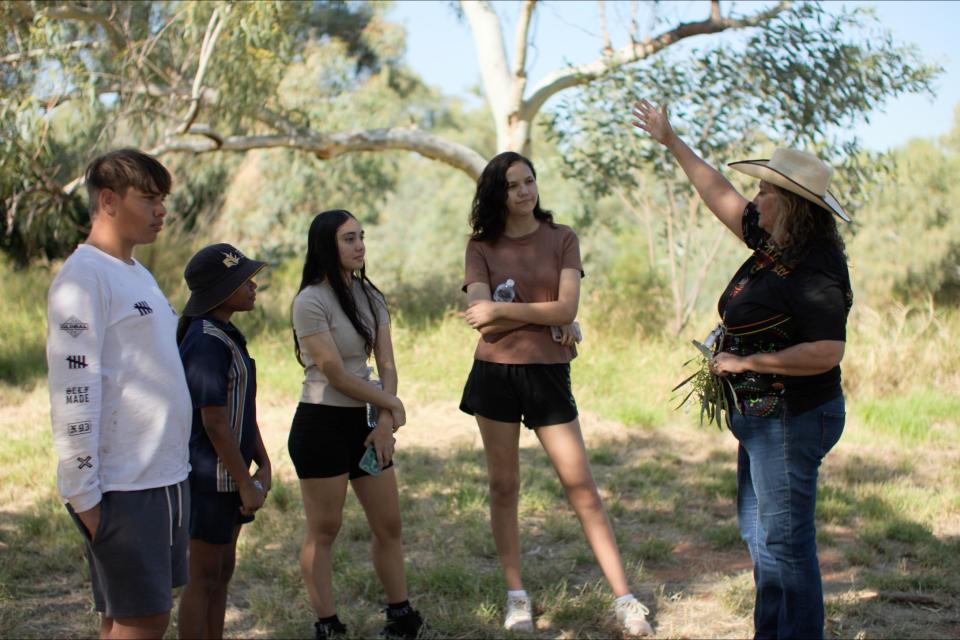UQ’s Poche Centre celebrates a decade of work to help close the gap in Indigenous health

Staff from Poche Centre for Indigenous Health.
(Photo credit: The University of Queensland )
Celebrating its 10-year anniversary, the First Nations-led health research centre has called on governments and research funding agencies to scale up funding allocations and capacity building to transform First Nations peoples’ health outcomes.
UQ Vice-Chancellor Professor Deborah Terry AC said the UQ Poche Centre is one of the university’s flagship centres and is focused on improving health outcomes for First Nations peoples.
“The UQ Poche Centre is considered one of the country’s leading Indigenous health research centres and has attracted leading researchers in their respective fields,” Professor Terry said.
“What started off as a handful of people has expanded to a team of almost 60 staff, 30 per cent of whom are Aboriginal and Torres Strait Islander peoples.
“The facility has secured more than $37 million in competitive research grant funding and published more than 400 articles since its inception and continues to add world-class knowledge about Indigenous health outcomes.”
The UQ Poche Centre is one of 5 health research centres across Australia which form the Poche Indigenous Health Network, established in 2015 with funding from philanthropists Greg Poche AO and the late Kay Van Norton Poche.
Since 2020, Pitjantjatjara and Narungga man Professor James Ward has been director of the centre, the only one in Australia with a special focus on urban Indigenous health research.
“Our goal is to have real impact and ensure research findings are integrated into routine primary care or adopted into policy or clinical guidelines and have impact on our people’s health and wellbeing,” Professor Ward said.

Participants in the Poche Centre's Let's Yarn About Sleep program.
(Photo credit: The University of Queensland)
“Australia has a rapidly growing First Nations population, that is increasingly becoming urbanised, and we are working in systems and structures that do not completely align with Indigenous ways of being, doing and knowing.
“We work closely with the Institute for Urban Indigenous Health (IUIH) and over 100 Aboriginal community-controlled health services (ACCHS) across Australia to transform First Nations peoples’ experiences of injustice and inequity in health.
“Our regionalised Indigenous Urban Health Research Agenda generates research that’s of priority to First Nations communities and will improve care delivery and results over many years to come.
“However, we need governments and funding bodies to reimagine understandings of First Nations health research in Australia and find innovative ways to fund initiatives that better align with our communities’ aspirations.”
Infectious diseases, urban health, maternal and child health, and factors impacting life expectancy are among the core research programs.
Professor Ward also wants to continue to grow the next generation of Indigenous researchers.
“This is another goal for us, to help continue the momentum of change,” he said.
“Later this year there will be 5 Indigenous students to graduate with a PhD and next year another 5 and we want to double and treble this in years to come.
“There are less than 1000 Aboriginal and Torres Strait Islander peoples with a PhD and to have 5 graduate at the same time will be an amazing achievement.”
UQ Poche Centre for Indigenous Health Advisory Board Member and Patron of the Poche Network Professor Tom Calma AO said the centre has built its work on trust.
“There has been meaningful engagement with Aboriginal and Torres Strait Islander peoples, communities, health services and organisations across Australia,” Professor Calma said.
“These collaborations will help ensure it continues to deliver research that creates change and contributes to a more equitable health system for Aboriginal and Torres Strait Islander peoples.”
Related articles
UQ researcher investigates Indigenous health inequalities
Indigenous health study rolls out across Queensland
Media contact
UQ Communications
communications@uq.edu.au
+61 429 056 139
